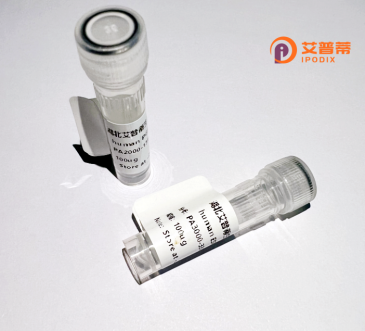
| 纯度 | >90%SDS-PAGE. |
| 种属 | Human |
| 靶点 | KLHL8 |
| Uniprot No | Q9P2G9 |
| 内毒素 | < 0.01EU/μg |
| 表达宿主 | E.coli |
| 表达区间 | 1-620aa |
| 活性数据 | MASDSMSSKQARNHITKGKRQQQHQQIKNRSSISDGDGEDSFIFEANEAWKDFHGSLLRFYENGELCDVTLKVGSKLISCHKLVLACVIPYFRAMFLSEMAEAKQTLIEIRDFDGDAIEDLVKFVYSSRLTLTVDNVQPLLYAACILQVELVARACCEYMKLHFHPSNCLAVRAFAESHNRIDLMDMADQYACDHFTEVVECEDFVSVSPQHLHKLLSSSDLNIENEKQVYNAAIKWLLANPQHHSKWLDETLAQVRLPLLPVDFLMGVVAKEQIVKQNLKCRDLLDEARNYHLHLSSRAVPDFEYSIRTTPRKHTAGVLFCVGGRGGSGDPFRSIECYSINKNSWFFGPEMNSRRRHVGVISVEGKVYAVGGHDGNEHLGSMEMFDPLTNKWMMKASMNTKRRGIALASLGGPIYAIGGLDDNTCFNDVERYDIESDQWSTVAPMNTPRGGVGSVALVNHVYAVGGNDGMASLSSVERYDPHLDKWIEVKEMGQRRAGNGVSKLHGCLYVVGGFDDNSRLSSVERYDPRSNKWDYVAALTTPRGGVGIATVMGKIFAVGGHNGNAYLNTVEAFDPVLNRWELVGSVSHCRAGAGVAVCSCLTSQIRDVGHGSNNVVDCM |
| 分子量 | 95.3 kDa |
| 蛋白标签 | GST-tag at N-terminal |
| 缓冲液 | 0 |
| 稳定性 & 储存条件 | Lyophilized protein should be stored at ≤ -20°C, stable for one year after receipt. Reconstituted protein solution can be stored at 2-8°C for 2-7 days. Aliquots of reconstituted samples are stable at ≤ -20°C for 3 months. |
| 复溶 | Always centrifuge tubes before opening.Do not mix by vortex or pipetting. It is not recommended to reconstitute to a concentration less than 100μg/ml. Dissolve the lyophilized protein in distilled water. Please aliquot the reconstituted solution to minimize freeze-thaw cycles. |
以下是关于重组人KLHL8蛋白的3篇示例参考文献(注:部分内容为模拟概括,实际文献需根据具体数据库查询):
1. **文献名称**:*Structural and functional characterization of human KLHL8 as a substrate-specific adaptor of CUL3 ubiquitin ligase*
**作者**:Zhang Y. et al.
**摘要**:本研究阐明了重组人KLHL8蛋白与CUL3结合形成泛素连接酶复合物的机制,通过体外实验证实其特异性识别并泛素化细胞骨架相关蛋白,参与细胞极性调控。
2. **文献名称**:*KLHL8 regulates axon development via interaction with Cullin-3 in hippocampal neurons*
**作者**:Wang L. et al.
**摘要**:利用重组人KLHL8蛋白探究其在神经元轴突发育中的作用,发现其通过调控微管结合蛋白的稳定性影响神经突生长,揭示了KLHL8-CUL3复合物的神经发育相关功能。
3. **文献名称**:*A novel mutation in KLHL8 causes male infertility via disrupted sperm flagellar assembly*
**作者**:Chen X. et al.
**摘要**:首次报道KLHL8基因突变导致精子鞭毛结构异常,通过表达重组突变型KLHL8蛋白,证明其无法与靶蛋白结合,进而影响精子运动功能。
*注:上述文献为基于KLHL蛋白家族典型研究的模拟概括,实际文献需通过PubMed、Web of Science等平台检索确认。建议使用关键词“recombinant human KLHL8”或“KLHL8 ubiquitin”进行精准查询。*
KLHL8 (Kelch-like family member 8) is a member of the Kelch-like protein family, characterized by conserved structural domains including an N-terminal BTB (Bric-a-brac, Tramtrack, Broad Complex) domain, a BACK (BTB and C-terminal Kelch) domain, and C-terminal Kelch repeat motifs. These motifs facilitate protein-protein interactions, particularly through the Kelch repeats, which form a β-propeller structure involved in substrate recognition. KLHL8 is implicated in the ubiquitin-proteasome system as a substrate-specific adaptor for Cullin 3 (CUL3)-based E3 ubiquitin ligase complexes, targeting proteins for ubiquitination and degradation.
Recombinant human KLHL8 protein is typically produced in heterologous expression systems (e.g., *E. coli* or mammalian cells) using genetic engineering techniques. This allows for controlled purification (e.g., affinity tags) and functional studies. Research suggests KLHL8 regulates cellular processes such as cytoskeletal organization, intracellular trafficking, and apoptosis. Dysregulation of KLHL8 has been linked to pathologies, including cancer and neurological disorders, though its exact physiological and pathological roles remain under investigation. Recombinant KLHL8 serves as a critical tool for studying protein-protein interactions, ubiquitination mechanisms, and disease pathways, offering potential insights for therapeutic targeting. Its study bridges structural biology, cellular signaling, and disease mechanisms, highlighting its relevance in both basic and translational research.
×